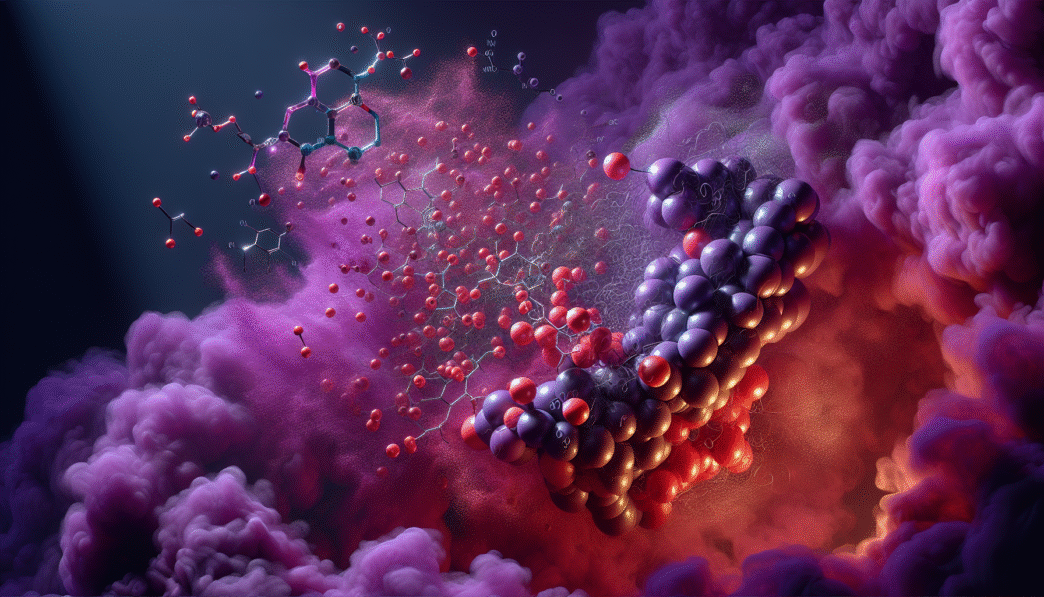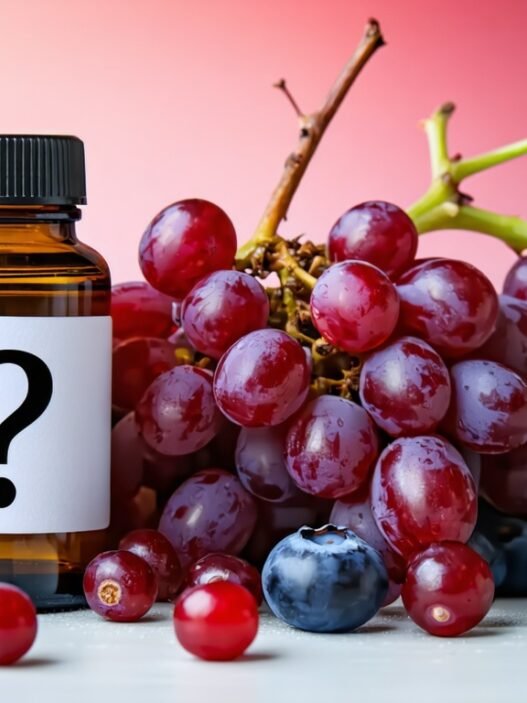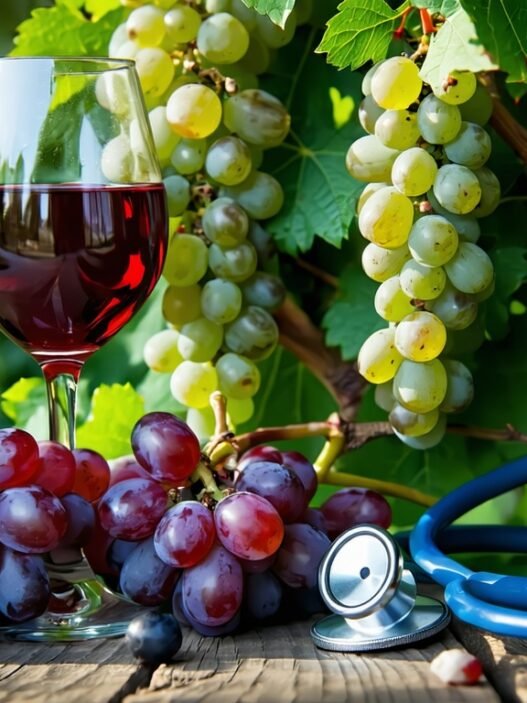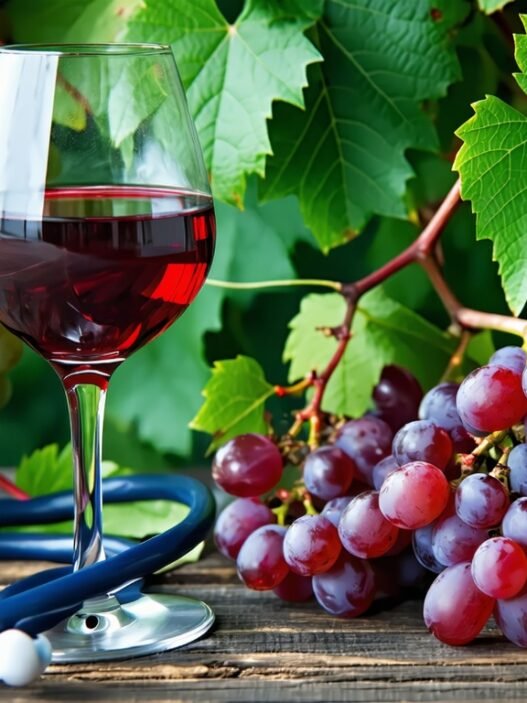Understanding CoQ10 and Resveratrol
To understand the potential combined benefits of CoQ10 and resveratrol, it’s essential to first explore each compound individually. Both have distinct roles in promoting health and combating the signs of aging.
Basics of CoQ10
Coenzyme Q10 (CoQ10) is a naturally occurring enzyme found in nearly every cell and tissue in the body. It plays a critical role in energy metabolism by assisting in the production of adenosine triphosphate (ATP), the key energy carrier in cells. CoQ10 acts as an antioxidant, which helps protect cells from oxidative stress and damage.
One of its significant functions is maintaining mitochondrial functionality, which tends to decline with age. By supporting energy production and serving as an antioxidant, CoQ10 may help counteract age-related mitochondrial dysfunctions, contributing to cellular homeostasis during aging.
| Key Functions of CoQ10 |
|---|
| Energy production (ATP) |
| Antioxidant protection |
| Supports mitochondrial function |
Basics of Resveratrol
Resveratrol is a powerful antioxidant found in foods such as red wine, grapes, cocoa, peanuts, and blueberries. It has garnered interest for its potential health benefits, particularly its ability to delay or prevent the progression of diseases like cancer, heart disease, and diabetes in animal studies. Additionally, resveratrol is known to activate enzymes associated with aging and longevity, such as SIRT1.
Moreover, resveratrol’s antioxidant properties may also contribute to overall health and longevity, making it a popular supplement among those interested in natural health and holistic wellness.
| Sources of Resveratrol |
|---|
| Red wine |
| Grapes |
| Cocoa |
| Peanuts |
| Blueberries |
By understanding the basic functions and sources of CoQ10 and resveratrol, individuals can better appreciate their potential combined benefits. This brings the crucial question of whether one can safely ask, “can I take CoQ10 and resveratrol together?” as part of a holistic approach to anti-aging and health. For further insights into the effects of resveratrol, refer to articles such as does resveratrol reverse aging? and is resveratrol anti-carcinogenic?.
Benefits of CoQ10
CoQ10, or coenzyme Q10, is a compound that plays a vital role in cellular energy production and is known for its potential health benefits, especially in aging, heart health, and physical performance.
CoQ10 for Aging
CoQ10 supplementation can positively influence the aging process by compensating for the natural decline of CoQ10 levels that occurs with age. This decline affects the electron transport chain, essential for energy production in cells. Additionally, the antioxidant properties of CoQ10 may help counteract age-related mitochondrial dysfunctions.
In studies, CoQ10 has been associated with better maintenance of overall health in older adults, enhancing energy levels and potentially slowing down processes associated with aging.
CoQ10 for Heart Health
The heart benefits significantly from CoQ10 supplementation. Clinical trials indicate that CoQ10 can reduce major cardiovascular events in patients suffering from chronic heart failure (NCBI). Regular intake may support heart health by improving overall cardiovascular function and potentially alleviating symptoms of heart-related conditions.
| Condition | Effect of CoQ10 Supplementation |
|---|---|
| Chronic Heart Failure | Reduces major cardiovascular events |
| General Heart Health | Supports cardiovascular function |
CoQ10 and Physical Performance
For those concerned about physical performance, CoQ10 supplementation may offer enhancements, especially in aging individuals. Studies have revealed that consistent CoQ10 intake over a four-year period significantly increased physical performance among older adults, suggesting it plays a role in maintaining muscle efficiency and endurance (NCBI).
| Age Group | Study Duration | Performance Improvement |
|---|---|---|
| Older Adults | 4 Years | Increased physical performance |
Physical activity also supports CoQ10 levels, demonstrating the importance of an active lifestyle in achieving optimal health.
In summary, CoQ10 promotes benefits that are vital for aging individuals. Its role in managing heart health and enhancing physical performance aligns with the holistic health approaches sought by individuals interested in natural wellness. For those considering combining CoQ10 with Resveratrol, they can explore more about whether can I take CoQ10 and resveratrol together?.
Benefits of Resveratrol
Resveratrol is a natural compound that has gained interest for its potential anti-aging properties. It offers several benefits, particularly as an antioxidant and for mitochondrial function, making it a popular choice among those seeking holistic wellness solutions.
Resveratrol as an Antioxidant
One of the primary benefits of resveratrol is its powerful antioxidant properties. Antioxidants are crucial for combating oxidative stress caused by free radicals in the body. By neutralizing these free radicals, resveratrol can help protect cells from damage and reduce the risk of various age-related diseases. This protective effect is particularly important as the body ages, making it more susceptible to oxidative damage.
Recent clinical trials and meta-analyses highlight resveratrol’s ability to enhance antioxidant activities, contributing to its reputation as a promising agent for promoting longevity (NCBI). The potential of resveratrol to improve cellular health by mitigating oxidative stress will draw continued interest in its usage amongst health enthusiasts.
Resveratrol for Mitochondrial Function
Resveratrol is well-regarded for its ability to enhance mitochondrial functionality, which plays a vital role in cellular energy production. Mitochondria are often referred to as the powerhouses of cells, as they are responsible for generating adenosine triphosphate (ATP), the energy currency of the cell. As individuals age, mitochondrial function tends to decline, leading to reduced energy levels and diminished cellular health.
Research shows that resveratrol can increase mitochondrial biogenesis—the process by which new mitochondria are formed. This enhancement may help improve overall cellular homeostasis and energy levels as people age (NCBI). In combination with other supplements like CoQ10, resveratrol may support mitochondrial health, making it a valuable consideration for individuals looking to maintain optimal energy and vitality.
The synergy between resveratrol and CoQ10 could potentially slow down the progression of age-related cognitive decline and various neurodegenerative diseases, offering a holistic approach to health and anti-aging (MASI).
By exploring the benefits of resveratrol, individuals can gain a better understanding of how this compound may contribute to their anti-aging regimen. For additional insights into the effects of resveratrol, check our articles on does resveratrol reverse aging? and is resveratrol anti-carcinogenic?.
Exploring CoQ10 and Resveratrol Synergy
The combination of CoQ10 and resveratrol has garnered attention for its potential synergistic effects on health, particularly concerning blood glucose regulation and longevity.
Synergistic Effects on Blood Glucose
Research indicates that both CoQ10 and resveratrol may play beneficial roles in managing blood glucose levels. Resveratrol has been shown to improve insulin sensitivity and glucose metabolism, mimicking the benefits of calorie restriction MASI. This is particularly noteworthy for individuals who may struggle with glucose regulation as they age.
CoQ10 supports mitochondrial function, which is critical for overall metabolic health. Together, these supplements offer a potential strategy for managing blood glucose levels and promoting metabolic wellness. For those considering this combination, regular blood tests can help monitor the effectiveness of resveratrol on glucose levels, which is a significant biomarker associated with aging InsideTracker.
| Supplement | Effect on Blood Glucose |
|---|---|
| Resveratrol | Improves insulin sensitivity |
| CoQ10 | Supports mitochondrial function |
Longevity and Aging Effects
The potential for CoQ10 and resveratrol to extend lifespan and enhance health during aging stems from their individual mechanisms. Resveratrol activates sirtuins, specifically SIRT1, enzymes involved in longevity, creating a biological environment resembling calorie restriction, which is known for its lifespan extension benefits InsideTracker.
Moreover, CoQ10 is vital for cellular health, particularly in supporting mitochondrial functions that are essential for energy production. When combined, they may slow the progression of age-related cognitive decline and mitigate the risk of neurodegenerative diseases such as Alzheimer’s and Parkinson’s MASI. This combination not only supports cardiovascular health but also may contribute to healthy aging through enhanced neuroprotection and improved metabolic health.
| Supplement | Mechanism | Potential Effect on Aging |
|---|---|---|
| Resveratrol | Activates sirtuins | Supports longevity |
| CoQ10 | Boosts mitochondrial function | Promotes cellular health |
Together, CoQ10 and resveratrol offer a holistic approach to health and wellness strategies focused on aging and longevity. Further exploration into their combined effects may yield fruitful insights for holistic wellness seekers. For more on the effects of resveratrol, explore our articles on does resveratrol reverse aging?, is resveratrol bad for the heart?, and is resveratrol bad for thyroid?.
Safety and Considerations
When considering supplementation with CoQ10 and resveratrol, it is important to be aware of appropriate dosages, potential side effects, and the necessity of medical consultation.
CoQ10 and Resveratrol Dosage
Coenzyme Q10 (CoQ10) is crucial for energy metabolism, stimulating cells’ mitochondria to produce energy and acting as an antioxidant. The recommended dosage can vary based on individual needs and health conditions but generally ranges from:
| Supplement | Recommended Dosage |
|---|---|
| CoQ10 | 100 to 200 mg per day |
| Resveratrol | 100 to 500 mg per day |
These dosages may provide energetic support, improve antioxidant properties, and enhance overall health. It is essential to follow usage guidelines from healthcare providers for optimal results.
Potential Side Effects and Interactions
Both resveratrol and CoQ10 have a favorable safety profile for most individuals. However, potential side effects might occur. Side effects can include:
| Side Effect | CoQ10 | Resveratrol |
|---|---|---|
| Gastrointestinal Issues | Common | Rare |
| Allergic Reactions | Rare | Possible |
| Lowered Blood Glucose | Possible | Possible |
Despite limited studies on longevity with these supplements, they demonstrate potential benefits in reducing blood glucose levels, a significant aspect of overall health (InsideTracker). Individuals should be aware of these possible interactions with medications, particularly blood thinners or those for diabetes management.
Consultation Before Consumption
Prior to incorporating any new supplements into a regimen, it is crucial to consult a medical doctor. This guidance ensures safety and appropriateness based on individual health profiles and conditions (InsideTracker). A healthcare professional can provide personalized advice to avoid possible negative effects and interactions, helping individuals make informed decisions about their supplementation. For more information on the potential risks associated with resveratrol, refer to our articles on why is resveratrol controversial and who should avoid it? and is resveratrol bad for the heart?.





















